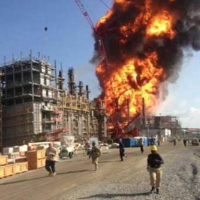Chemical Industry Self-Policing Called into Question, Government Oversight Lax
 Employee photo of explosion at Williams Chemical Plant in Louisiana, 2013
Employee photo of explosion at Williams Chemical Plant in Louisiana, 2013
The chemical industry claims that government regulation of it is unnecessary; that its voluntary standards are sufficient to keep its plants safe. But a new report (pdf) shows that that’s not the case.
The Center for Effective Government took a look at chemical plants in the United States and found that they’re endangering workers and the environment alike. What’s more, the chemical industry is not regulating itself despite its claims to the contrary.
“Every two days, there is a reportable leak or explosion at a U.S. chemical plant,” Katherine McFate, president and CEO of the Center for Effective Government, said in a release. “But the chemical industry keeps telling us companies can regulate themselves and no new oversight is needed.”
The American Chemical Council (ACC), the industry’s lobbying group, sponsors a program called Responsible Care, which is supposed to hold its members to certain safety standards. But in its investigation, the Center for Effective Government found that only 42% of active facilities manufacturing chemicals were inspected in the last three to five years and of those that were inspected, 25% had serious workplace safety and environmental violations.
Government oversight of the industry has been lax, according to the report. Part of that is due to the lack of teeth in the 1976 Toxic Substances Control Act (pdf) (TSCA), which was passed due to the increasing amounts of dangerous and untested chemicals used in commercial product production and processes. Although the law gave the Environmental Protection Agency (EPA) authority to ban chemicals that endanger humans, “TSCA does not make public health its overriding focus,” claims the report.
“Besides creating a gold mine for industry lawyers, the badly written law puts a huge burden on government scientists and experts to ‘prove’ a substance is dangerous,” the report goes on to say. “The result? EPA has required testing of only 250 of the 84,000 chemicals registered for commercial use in the U.S. today and banned or restricted only nine.”
The report also points out that penalties and fines even for causing the death of a worker are incredibly low. The Occupational Safety and Health Administration specifies a fine of $7,000 for a serious workplace violation, with the levy increasing to $70,000 for willful or repeated violations. DuPont, which owns a LaPorte, Texas, plant in which four workers died last year because of a chemical leak, was initially fined $99,000 for the incident. Because it had multiple significant workplace safety violations, $273,000 was added to the fine and the plant was added to the violators list of the Severe Violator Enforcement Program (pdf). And even though DuPont reported $34.76 billion in revenue in 2014, it’s fighting the amount of the fines.
It’s not that the public doesn’t want to see the industry regulated. A new poll shows that 79% of those surveyed want tougher regulation of the chemical industry. Even 70% of Republicans are on board with that.
However, the ACC has spent millions lobbying lawmakers. Between 2012 and 2014, the industry as a whole paid $182 million to try to influence policymakers. There are also elaborate public relations campaigns to spread disinformation about the safety of chemicals to the public.
-Steve Straehley
To Learn More:
New Report Finds Chemical Industry Is “Blowing Smoke” When It Claims Self-Regulation Works (Center for Effective Government)
Blowing Smoke (by Brian Gumm, Center for Effective Government) (pdf)
Poll Shows Bi-Partisan Support for New Rules to Prevent Chemical Disasters (Coalition to Prevent Chemical Disasters)
Chemical Industry and Republican Lawmakers Succeed in Stalling EPA Chemical Regulation Process (by Steve Straehley, AllGov)
EPA Allowed Chemical Industry to Control Panel Assessing Cancer Danger in Drinking Water (by Noel Brinkerhoff and Danny Biederman, AllGov)
“Chemicals of Concern” List Still on Hold after 21 Months of Chemical Industry Lobbying (by Matt Bewig, AllGov)
- Top Stories
- Unusual News
- Where is the Money Going?
- Controversies
- U.S. and the World
- Appointments and Resignations
- Latest News
- Trump Renames National Football League National Trump League
- Trump to Stop Deportations If…
- Trump Denounces World Series
- What If China Invaded the United States?
- Donald Trump Has a Mental Health Problem and It Has a Name






Comments